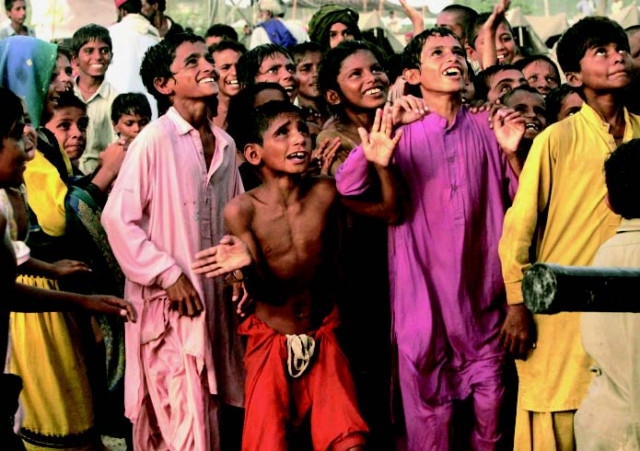Room for 19,000 more survivors at this camp
There are only 700 people at a relief camp on the outskirts of Karachi even though it has the capacity for 20,000.

Revenue official Mushtaq Qureshi, who was handing out relief goods, claimed that the camp at the Trading Corporation of Pakistan (TCP) godowns became operational only a few hours before my visit and that is why there were fewer survivors. He said that the survivors will continue to arrive and it would soon become the largest one in Karachi.
As of Monday evening, around 10 buses loaded with hundreds of victims had arrived at the camp. Government officials were registering each person and there was no shoving or pushing in the queue as they were handed out a slip. Each person was given a water cooler, a rug and pillow. Ample food was also available and washrooms were working too.
Most of the survivors are coming here from Thatta district but there are many others from far-flung areas such as Larkana, Shahdadkot and Shikarpur.
Ali Muhammad, 50, arrived from Thatta, Sunday night. Despite an amputated leg, he stood patiently in the long queue, waiting for his turn. Ali said that there were around 40 people of his immediate family and relatives who had accompanied him. “Since I’m the head of the family, I have to ensure everything for them,” he explained.
Ali’s family first moved to Makli, which is the closest city to Thatta. “But there was a lot of looting and rioting going on and we couldn’t get food for two whole days,” he said, adding that he was happy with the arrangements at the Karachi relief camps.
Daad Muhammad and 30 members of his family have come all the way from Shikarpur. “We settled at a relief camp in Khairpur, initially, but after a week an official told us to move out,” he claimed, adding that it was then that he decided to move to Karachi.
Daad Muhammad said he realised that the government was doing all it could at the camps. “The truth is that there are people from among us who are creating all sorts of trouble,” he said, citing many cases in which survivors like himsef had indulged in stealing items from other people.
He also criticised people for not using the government-installed toilets properly. “They make it dirty for other people and then complain that the government hasn’t made good arrangements for them,” he added.
Muhammad Hakim and Abdul Hakim, two brothers from Shahdadkot, experienced varied arrangements at different camps. “We were staying at another relief camp nearby in Razzaqabad, where we faced great difficulties in getting clean drinking water and food,” they said.
Town Health Officer Dr Yunus Chachar said medical teams were already stretched to their limits and many hospitals were creating problems in treating serious cases. “There is a 100-bed hospital nearby, which comes under the jurisdiction of Pakistan Steel,” he said, adding that “they don’t accept patients from our camps when we send them because they know they’ll have to treat them for free”.
Chachar said his team was vaccinating children with polio drops and adults were also being given vaccinations for hepatitis and waterborne diseases. A lady doctor, however, was missing from the camp and Chachar said he was trying his best to get one from another camp.
Published in The Express Tribune, August 31st, 2010.



















COMMENTS
Comments are moderated and generally will be posted if they are on-topic and not abusive.
For more information, please see our Comments FAQ